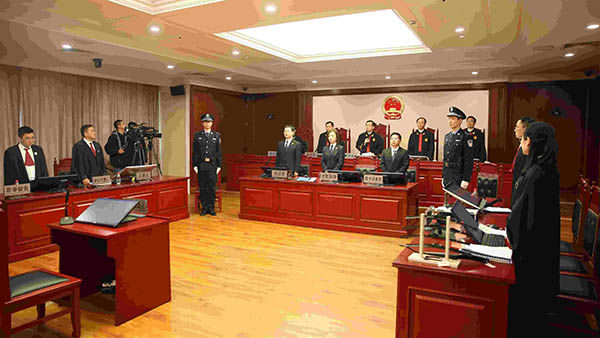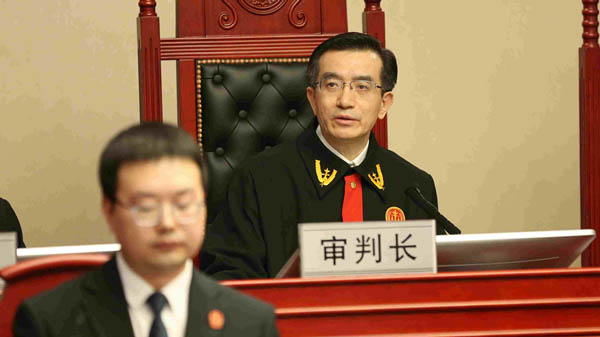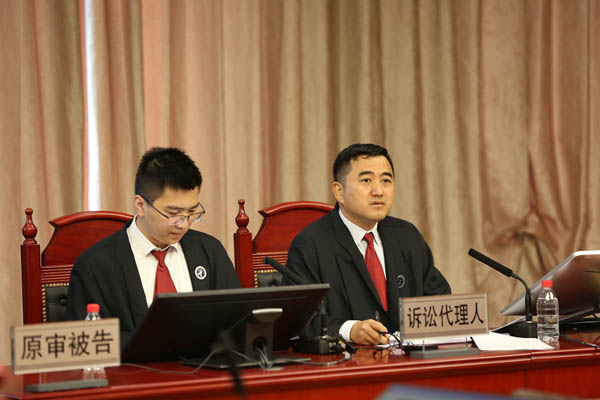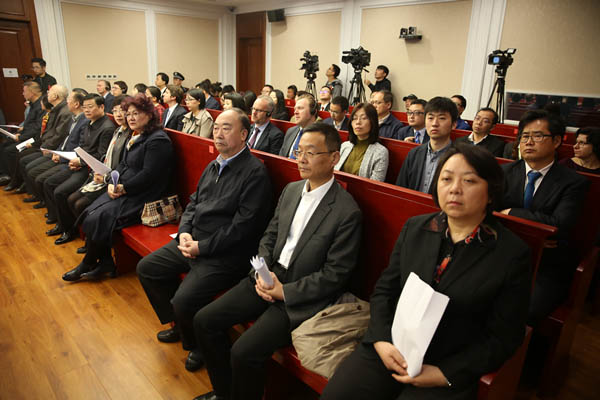
photo by CGTN
China's first national-level Intellectual Property (IP) Court made the first hammer on March 27, 2019, Luo Chuandoing, vice president of the Supreme Peolpe's Court, served as the presiding judge.

Luo Dongchuan, vice president of the Supreme People's Court and chief justice of the Intellectual Property Court (IP Court)/photo by CGTN
The case was about a French company suing a Chinese one, for infringement of a motor vehicle windscreen wiper IP design. Shanghai's IP Court first ruled in favor of the plaintiff in January. The defendant then appealed to the new national-level court, where judges rejected the appeal and announced their verdict in favor of the plaintiff as well.
During the trial, omnimedia were used to live broadcast and high-tech technology were also used to create a new trial experience.
During the trial, AR glasses were used to compare the products of the defendant and plaintiff, as a factual statement, and use expert assistants to assist intellectual property-related casses to solve high-tech technology in the trial process, because judges and lawyers don't understand and is difficult to distinguish the question of authenticity.
It was also the first public hearing by the Intellectual Property Court of the Supreme People's Court since the special court was set up on Jan 1.

The defendant and his legal counsel at the court/photo by CGTN
Valeo Systemess's D'ssuyage (hereinafter referred to as Valeo) is the owner of the patent of the Chinese invention patent of the name ZL200610160549.2 entitled "Connector for motor vehicle wiper and corresponding connecting device". Valeo filed a lawsuit in Shanghai Intellectual Property Court in 2016 that Xiaman Lucas Auto Parts Co.,Ltd (hereinafter referred to as Lucas Company) and Xiamen Fuke Auto Parts Co., Ltd. (hereinafter referred to as Fuco Company) did not permit Manufacturing, Sales, promised sales, manufactured by Chen Shaoqiang. The wiper products sold fell within the scope of their patent protection, requesting the ordering of Lucas, Fuco to stop the infringement, compensation for losses and reasonable expenses to stop the infringement temporarily calculated 6 million yuan. After Valeo applied for partial judgment, it was determined that Lucaus, Fuco constituted infringement and ordered it to stop the infringement.
In addition, Valeo also filed an application for temporary behavior preservation (also known as temporary injunction), requesting the court to rule that Lucas, Fuco immediately stopped the infringement. The Shanghai Intellectual Property Court made a partial judgment on January 22, 2019, and judged that Lucas Company, Fuco Company constitute infringement and ordered it to stop the infringement.
Lucas Company, Fuke Company refused to accept the above-mentioned partial judgment, appealed to the Supreme People's Court, requested to revoke the judgment, and rebutted Valeo's claim for stopping the infringement.
Through trail, the alleged infringing product is the "wiper connector" described in the patent claim 1 for ensuring the connection and articulation between a wiper arm and a wiper brush body." The scope of protection.
The alleged infringing product is "includes at least one elastically deformable element" as described in the patent claim 1 of the present invention - the element locks the connector in an embedded position in the front end portion of the wiper arm Upper protection range and falling into the embedded position of the connector locked in the wiper arm by a safety buckle as described in the patent claim 1 of the invention. In the closed position, the safety buckle faces the lock Element extension for preventing elastic deformation of the locking element and locking the protection range of the connector.

Public gallery is seen packed with observers/photo by CGTN
Article 11 (1) of the Patent Law of the People's Republic of China stipulates that after the invention patent right is granted, no entity or individual may implement its patent without the permission of the patentee, except as otherwise provided by the Patent Law. It is not allowed to manufacture, use, sell or import its patented products for the purpose of production and operation. Article 118 of the General Principles of the Civil Law of the People's Republic of China stipulates that the patent rights of citizens are infringed and have the right to stop the infringement. In this case, the plaintiff Valeo is the patentee of the patent involved, and the patent is still in its effective state. Except as otherwise provided by the Patent Law, no unit or individual may manufacture, use, sell, or import its patented products for the purpose of production or business operations without its permission. As mentioned above, the S850, S851, and S950 models of the alleged infringing products fall within the scope of protection of the patent claims 1-3 and 6-10, and the plaintiff has the right to stop the infringement.
Ma Yide, deputy director of China Intellectual Property Law Association said: "Today's trial was highly professional and declared the judgment immediately. It is a declaration to the world that China determines to protect IP rights in a new round of opening up."
March 28, 2019









